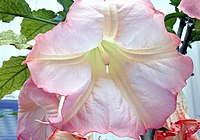
Photo from wikipedia
Abstract Lycium ferocissimum (African boxthorn) is a Weed of National Significance in Australia. Biological control may have potential to manage this weed, but taxonomic uncertainty needs to be addressed first… Click to show full abstract
Abstract Lycium ferocissimum (African boxthorn) is a Weed of National Significance in Australia. Biological control may have potential to manage this weed, but taxonomic uncertainty needs to be addressed first to facilitate searches for potential agents. We sampled putative L. ferocissimum (i.e. tentatively identified morphologically in the field) across its native range in South Africa and introduced range in Australia. Morphometric and genetic analyses were conducted to confirm the species identity of these samples, and to assess morphological and genetic variation across both ranges. All samples collected in Australia were confirmed as L. ferocissimum, with no evidence of hybridisation with any other Lycium species. Nuclear and chloroplast genetic diversity within L. ferocissimum across both South Africa and Australia was low, with no evidence of genetic structure. One of the two common chloroplast haplotypes found across Australia was found at only two sites in South Africa, both near Cape Town, suggesting that the Australian lineage may have originated from this region. Ten samples from South Africa putatively identified in the field as L. ferocissimum were genetically characterised as different (unidentified) Lycium species. Our morphometric analyses across different Lycium species in South Africa did not identify any leaf or floral characteristics unique to L. ferocissimum, and thus morphological identification of the latter species in its native range may remain problematic. To ensure the correct Lycium species is surveyed for candidate biological control agents we suggest that individuals should be permanently tagged and putative morphological determinations supplemented with genetic analyses to confirm species identity.
Journal Title: Biological Control
Year Published: 2020
Link to full text (if available)
Share on Social Media: Sign Up to like & get
recommendations!